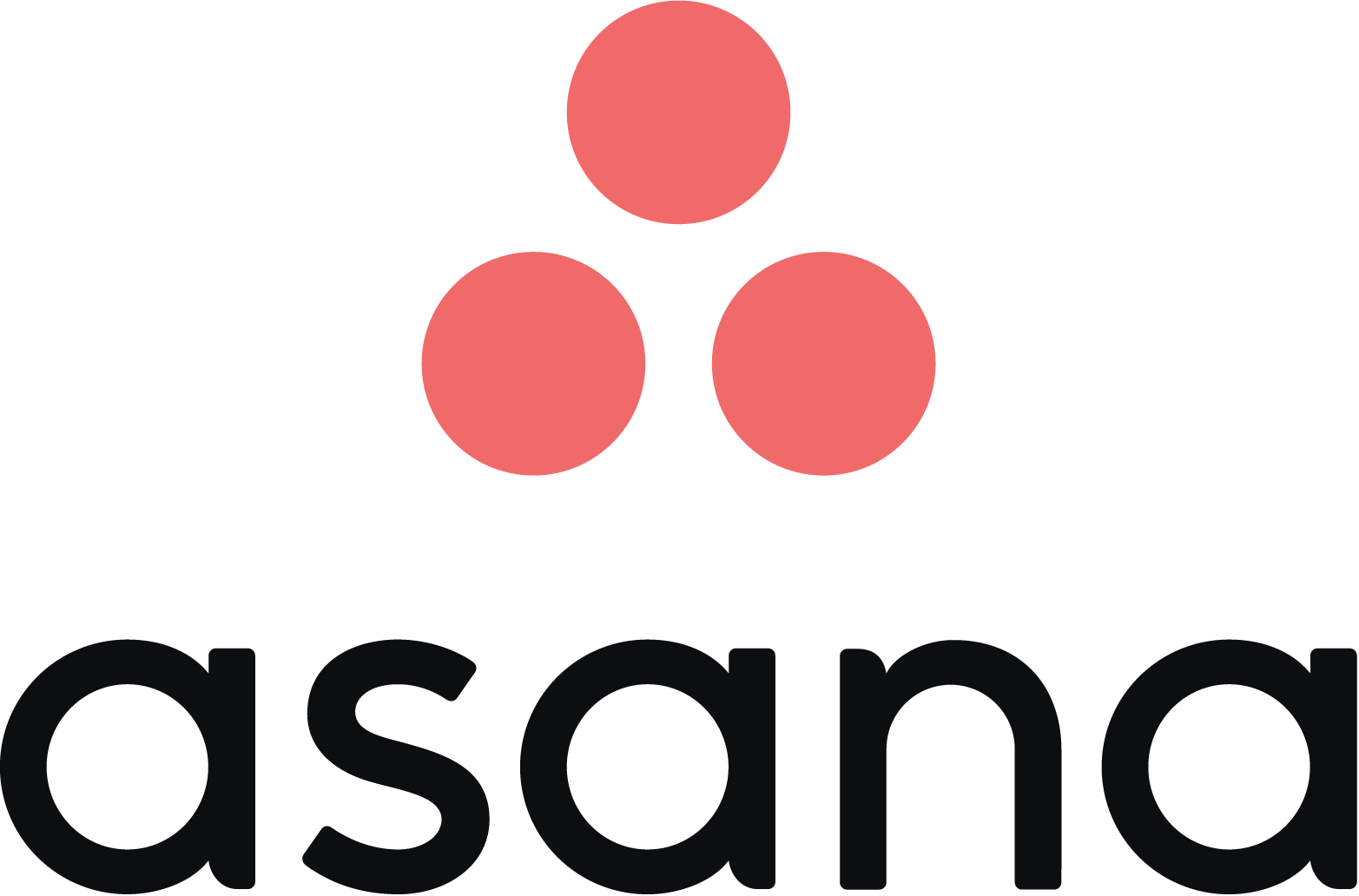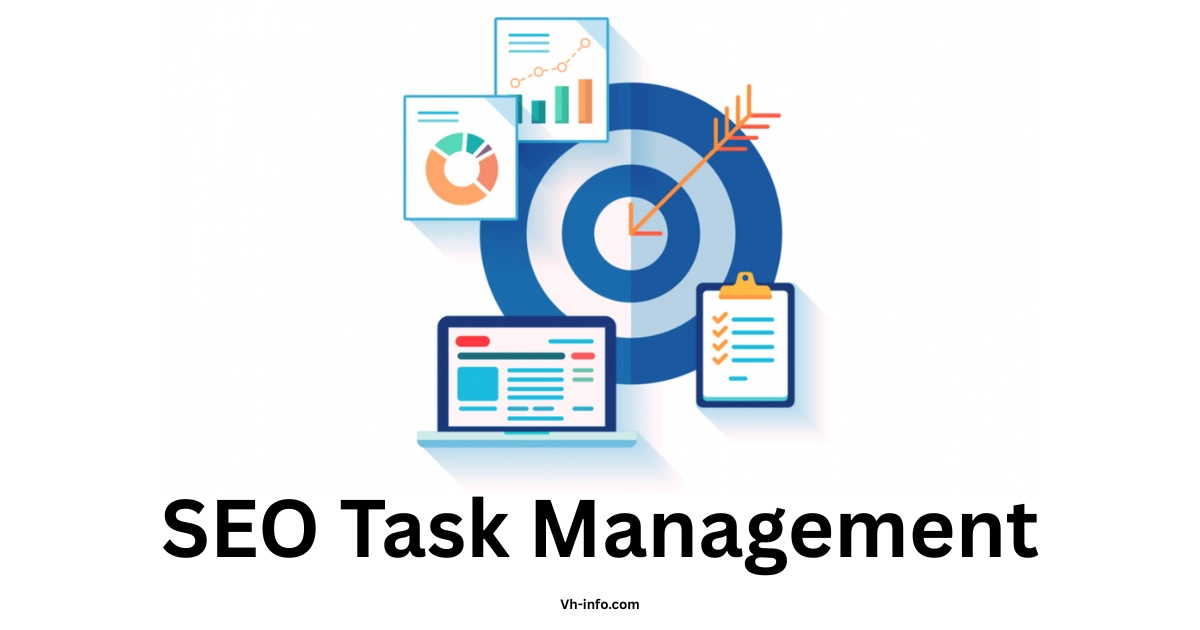In the fast-paced realm of SaaS digital marketing, staying ahead requires more than just innovative software. Effective search engine optimization (SEO) is critical to ensure your product reaches its intended audience.
However, managing the various SEO tasks involved can quickly become overwhelming.
That’s where SEO task management comes in. It transforms the complex process of search engine optimization into manageable steps, helping you drive organic traffic and achieve your SEO goals.
At VH Info, we understand the challenges of SEO project management, and we’re here to guide you through creating an effective SEO strategy that delivers the best results.
What is SEO Task Management?

SEO task management is the process of planning, organizing, and overseeing all SEO activities required to improve a website’s traffic and search results.
It involves breaking down a larger SEO project into smaller, actionable daily tasks, assigning responsibilities, setting deadlines, and monitoring project progress. Think of it as project management specifically tailored for SEO efforts.
This structured approach ensures that all aspects of your SEO campaign, from keyword research to link building, are handled efficiently and effectively. By implementing robust SEO management, you can optimize your resources and achieve better SEO performance.
Why is SEO Task Management Important?

SEO task management is vital for several reasons. It brings structure and clarity to your SEO strategies, ensuring that all various tasks are completed on time and to a high standard. Without it, you risk wasting resources on uncoordinated SEO efforts that yield poor SEO results.
Effective SEO project management helps you:
- Stay Organized: Keeps track of all SEO tasks and deadlines.
- Improve Efficiency: Streamlines workflows and minimizes wasted effort.
- Enhance Team Collaboration: Ensures the entire team is on the same page.
- Maximize SEO Performance: Drives better keyword rankings and organic traffic.
- Achieve SEO Goals: Aligns SEO activities with your business objectives.
- Optimize Resources: Makes the most of your budget and personnel.
- Track Progress: Monitors performance metrics to measure success.
Essential SEO Tasks

Every successful SEO project includes several core components.
Here’s a breakdown:
- Keyword Research and Analysis: This is where you figure out what words people type into search engines like Google to find businesses like yours. It’s not just about guessing; it’s about using tools to find target keywords that can drive website traffic and boost your SEO efforts. Understanding these new keywords helps shape your content and SEO strategy.
- On-Page Optimization: Think of this as tidying up your website so that search engines understand what each page is about. This means tweaking titles, meta descriptions, and content to include your target keywords naturally. Good on-page optimization improves user experience and helps search engines rank your site higher, resulting in better search results.
- Link Building: This is like getting votes of confidence from other websites. When other credible sites link to yours, it tells search engines that your site is trustworthy and authoritative. Effective link building is essential for improving your SEO performance and increasing organic traffic; VH Info offers SEO services for link building that can help you grow your online presence.
- Technical SEO: This is the behind-the-scenes stuff that makes your website easy for search engines to crawl and understand. It includes things like improving site speed, ensuring your site works well on mobile devices, and fixing broken links. A technically sound website is important for achieving high keyword rankings.
- Content Creation and Optimization: High-quality content is what keeps visitors engaged and coming back for more. Producing high-quality content consistently is fundamental to any successful SEO strategy, as it helps draw in your target keywords and potential customers while enhancing your SEO management through effective content optimization.
How To Build An Effective SEO Project Management Plan – A Step-By-Step Guide

Creating a robust SEO project management plan ensures that your SEO efforts are coordinated and effective.
Here’s a step-by-step guide:
Step 1: Initial Research and Analysis
Before diving into any SEO activities, it’s important to understand where you stand. Start with a competitive analysis to see what your competitors are doing and where they’re succeeding.
Also, use tools like Google Search Console and Google Analytics to analyze your current keyword rankings and organic traffic. This initial research will help you identify opportunities and set realistic SEO goals.
Step 2: Setting Goals and KPIs
Now that you have a clear picture of your current situation, it’s time to define what you want to achieve. Set specific, measurable SEO goals, such as increasing organic traffic by a certain percentage or improving keyword rankings for key terms.
Identify your Key Performance Indicators (KPIs), like conversion rate and bounce rate, to measure project progress. These goals will guide your SEO strategies and help you track SEO performance.
Step 3: Task Identification and Assignment
With your goals in mind, break down your SEO project into smaller, manageable SEO tasks.
Identify all the various tasks needed, from keyword research and on-page optimization to link building and technical SEO. Assign each SEO task to a specific team member, ensuring everyone knows their responsibilities.
This ensures efficient SEO management and team collaboration.
Step 4: Establishing Timelines To Reach Milestones
Create a realistic timeline for each SEO task, setting deadlines and milestones to keep your project progress on track.
Use a project management template or project management software to visualize your timeline and ensure everyone knows when tasks are due. This helps maintain focus and avoid delays in your SEO efforts.
Step 5: Resource Planning
Assess the resources required for each SEO task, including budget, personnel, and tools.
Make sure you have the necessary resources to complete each task effectively. Proper resource planning ensures that your SEO team has what they need to achieve the best results and that your SEO campaign stays within budget.
Step 6: Implementation and Execution
Put your SEO strategies into action and start implementing the identified SEO tasks.
Ensure that all SEO activities are executed to a high standard and align with your SEO goals. Regular monitoring and quality checks are essential during this phase to achieve the desired SEO results.
Step 7: Monitoring and Reporting
Regularly monitor your performance metrics and track project progress.
Use Google Analytics and other tools to measure your SEO performance and identify areas for improvement. Generate regular reports to keep stakeholders informed about the SEO results and the impact of your SEO efforts on website traffic.
Step 8: Review and Optimization
At the end of each month (or specified period), review your SEO results and analyze what worked and what didn’t.
Identify areas where you can improve your SEO strategies and optimize your plan accordingly. Continuous review and optimization are essential for maximizing your SEO performance and achieving long-term success in your SEO project.
Who Should Be In Charge Of SEO Task Management?

The person in charge of SEO task management can change based on the size of the company.
In small businesses, it is often the marketing manager or an SEO expert. They make sure tasks match with business goals.
In bigger companies, there is usually an SEO project manager. This person focuses on organizing tasks and checking progress. They use special software to help with this.
A digital marketing agency like VH Info can also handle your SEO work. We offer skilled help for your projects.
Do SEO Tasks Need To Be Done Every Month?

Yes, absolutely! SEO maintenance is an ongoing process, and many SEO activities should be performed monthly to keep your website traffic growing and your search results strong.
While some SEO tasks, like initial keyword research, are one-time, many others require regular attention. This includes monitoring keyword rankings, analyzing organic traffic patterns, optimizing content with target keywords, and conducting link building outreach.
Regular SEO maintenance ensures that your website stays competitive, adapts to algorithm updates, and continues to attract organic traffic from search engines. It’s all about consistent SEO management to achieve the best results over time.
SEO Tasks For Monthly Maintenance

Monthly SEO maintenance means doing regular checks and updates to keep your website in good shape.
- Examine Organic Traffic Patterns: Keep a close eye on your website’s traffic from search engines. Look for any big changes—spikes or drops—and figure out why they’re happening. Understanding these patterns helps you refine your SEO strategies and capitalize on what’s working. This analysis is key to maintaining steady growth in organic traffic.
- Evaluate Your Rankings: Regularly check where your target keywords rank in search results. Are you moving up, down, or staying put? Knowing your keyword rankings helps you gauge the effectiveness of your SEO efforts and identify areas that need more attention. Consistent monitoring ensures you stay competitive in the search engine.
- Review SERP Features: SERP features (like featured snippets or knowledge panels) can significantly boost visibility. Keep an eye on which ones you’re showing up in and try to optimize for more. Capturing these features can drive more organic traffic and establish your site as an authority.
- Optimize Outdated or Underperforming Content: Over time, some content may become stale or lose keyword rankings. Identify these pages and update them with fresh information and target keywords. Content optimization not only improves search results but also provides a better user experience, keeping visitors engaged.
- Add New Internal Links: Internal link building helps search engines understand your website’s traffic structure and improve navigation. Adding new links to relevant pages can boost their authority and help spread link building juice throughout your site. Effective internal linking enhances both SEO and user experience.
- Research New Keywords to Target: Don’t get stuck on the same old keywords. Continuously research new keywords to identify emerging trends and opportunities. Targeting new keywords can help you attract a wider audience and stay ahead of the competition.
- Analyze the Competition: Regularly conduct competitor analysis to see what your competitors are doing right (and wrong). Identify their target keywords, link building strategies, and content tactics. This intel helps you refine your SEO efforts and stay competitive.
- Keep Up With Trends: SEO is always changing, so it’s vital to stay informed about the latest trends and algorithm updates. Follow industry blogs, attend webinars, and experiment with new strategies. Keeping up with trends ensures your SEO management remains effective.
- Produce New Content: Consistently create blog posts and publish fresh, high-quality content. New content attracts organic traffic, keeps your website relevant, and provides opportunities to target new keywords. Regular content creation is a cornerstone of a successful SEO strategy.
- Audit New and Lost Backlinks: Monitor your backlink profile to identify new and lost backlinks. Investigate any lost backlinks and take steps to reclaim them if possible. Also, analyze new backlinks to ensure they’re from reputable sources.
- Conduct Link Building Outreach: Actively reach out to other websites to build relationships and earn valuable backlinks. Focus on creating high-quality content that others will want to link to. Effective link building outreach is essential for improving your domain authority.
- Check for Errors and Technical SEO Issues: Regularly check your website for technical SEO issues like broken links, crawl errors, and site speed problems. Use tools like Google Search Console to identify and fix these issues. Addressing these technical aspects improves user experience and SEO performance.
- Improve Site Speed and User Experience: Site speed is an important ranking factor. Optimize your website to improve its loading time and enhance user experience. A fast, user-friendly site keeps visitors engaged and signals to search engines that your site is valuable.
- Benchmark Performance: Track your performance metrics over time to see how your SEO efforts are paying off. Compare your SEO results against industry benchmarks to identify areas for improvement. Regular benchmarking ensures that you’re making progress and achieving your SEO goals.
Challenges In SEO Project Management

SEO project management is very important for being seen online. However, some challenges can get in the way of reaching our goals. Tackling these problems early on helps SEO campaigns run smoothly.
This section will look at common problems faced in SEO project management. It will also provide clear solutions to help. By knowing these issues and using the right strategies, we can improve our results.
- Creative (And Unmanageable) Team Members: The content for your SEO campaign needs to be unique and creative, which means you need creative people. However, creative minds don’t always stick to timelines. Getting them to respect deadlines while still letting them be creative can be tricky. The solution is to set clear, approved timelines upfront and make sure everyone sticks to them. VH Info is a leader in SaaS link building SEO services, and understands the balance of working with creative teams!
- Rewarding Team Members Can Be Difficult: SEO is often a team effort, where many various tasks need to be done together to get results. Because of this, it can be hard to link a specific result to a specific person, making it tough to reward individuals. To solve this, make sure everyone’s input is recognized to create trust and camaraderie. Also, celebrate milestones to maintain enthusiasm for your SEO team and content marketing.
- Lack Of SEO knowledge: If people don’t understand SEO, it can be a challenge. It’s important to educate your team and even clients about how SEO works. For example, clients need to understand that you can’t just add target keywords to a website and expect to rank number one on Google right away. The key is to have a clear plan of what you can deliver and to set realistic expectations.
- Lack Of Visibility For Clients: Clients need to know what’s going on with their SEO project. If they don’t see what you’re doing or understand the SEO results, they might get frustrated. Provide regular updates and reports to show them the project progress and explain how your SEO efforts are paying off.
- It Takes Time To Show Results: SEO results don’t happen overnight. It usually takes months to see sustained increases in organic traffic, leads, and revenue. Managing client expectations is important. Be upfront about the timeline and explain that SEO is a long-term investment.
- Staying Up-To-Date On What Google Wants: Google’s algorithms change all the time, so it’s essential to stay informed about the latest updates. Follow Google’s official announcements, read industry blogs, and attend webinars to keep up with trends. Adapting to these changes is vital for maintaining your keyword rankings and ensuring your SEO strategies remain effective.
Strategies For Effective Workflow and Task Management

Making workflow and task management better is important for success. Using the right methods can boost efficiency, cut down on mistakes, and raise productivity in SEO teams.
The strategies below aim to improve workflows and task management. This helps SEO experts stay organized and concentrate on getting great results for their clients.
- Partner With White-Label Agencies: When you need extra help with SEO services or specialized skills, teaming up with a white-label agency can be a smart move. They can handle specific SEO tasks like link building or content optimization while you focus on overall SEO management and client relationships. VH Info’s SaaS link building SEO services are designed to augment your team’s capabilities and improve your SEO performance.
- Use Project Management Tools: To keep your SEO projects organized, use project management software like Asana, ProProfs Project, Trello, or Monday.com. These tools help you track SEO tasks, assign responsibilities, set deadlines, and monitor project progress. They improve team collaboration and ensure everyone stays on the same page.
- Organize Regular Team Meetings: Regular team meetings can help to make sure that you have effective team collaboration. Schedule regular meetings to discuss project progress, address challenges, and share updates on SEO strategies. This helps maintain alignment and keeps everyone informed about the various tasks at hand.
- Focus On Task Prioritization: When you have a lot of SEO tasks to juggle, it’s important to prioritize. Focus on the tasks that will have the biggest impact on your SEO goals. Prioritize keyword research, content optimization, and link building efforts that directly contribute to improving keyword rankings and driving organic traffic.
- Never Miss Out On Documentation and SOPs: Create detailed documentation and standard operating procedures (SOPs) for all SEO tasks. This ensures that everyone on your team follows the same processes and maintains a consistent level of quality. Clear documentation also makes it easier to train new keyword team members and scale your SEO operations.
- Create Effective Feedback Loops: Establish feedback loops to gather input from your team and clients. Encourage open communication and solicit feedback on your SEO strategies and processes. Use this feedback to identify areas for improvement and optimize your workflows.
- Invest In Training and Development: SEO is a constantly evolving field, so it’s important to invest in ongoing training and development for your team. Provide opportunities for them to learn about the latest SEO trends, algorithm updates, and best practices. This ensures that your team has the skills and knowledge to deliver the best results and stay ahead of the competition.
Trends In SEO Project Management Software For 2025

- Evolving Features: Project management software is getting smarter all the time. We’re seeing more AI-powered features that can automate SEO tasks, predict potential issues, and even suggest SEO strategies. These evolving features help SEO teams work more efficiently and make data-driven decisions to improve SEO performance.
- Novel and Unusual Functionality: Some project management software is starting to offer unique features you might not expect. Think gamification to make SEO tasks more engaging, or even virtual reality integration for team collaboration. This novel functionality can help boost productivity and make SEO project management more fun.
- Most Important and In-Demand Features: Even with all the fancy new stuff, some features remain essential. SEO teams still rely heavily on task management, team collaboration, time tracking, and detailed reporting to stay organized and on track. These in-demand features are the foundation of effective SEO project management.
- Declining in Importance: As project management software becomes more integrated with other digital marketing tools, some features are becoming less critical. For example, basic file sharing and email integration aren’t as important now that many platforms offer seamless connections to other services. Instead, teams are looking for features that directly enhance SEO efforts and improve SEO results.
KPIs To Track The SEO Performance Of Larger Projects

- Organic Traffic: This is the lifeblood of your SEO efforts. It’s the number of visitors coming to your website from search engines. Monitoring organic traffic helps you see if your SEO strategies are actually driving more people to your site. An increase in organic traffic usually means your keyword rankings are improving and your content optimization is working.
- Keyword Rankings: Keep a close eye on where your target keywords rank in search results. Are you on page one for your most important terms? Tracking keyword rankings shows you how well your SEO efforts are performing and helps you identify opportunities to improve your SEO strategies.
- Backlink Profile: The quality and quantity of backlinks pointing to your website are important. A strong backlink profile signals to search engines that your site is authoritative and trustworthy. Monitor your backlink profile to ensure you’re earning valuable backlinks from reputable sources, as this directly impacts your SEO performance. VH Info’s SaaS link building company is dedicated to enhancing your online presence.
- Conversion Rate: It’s not just about getting people to your site; it’s about what they do once they get there. Track the conversion rate of your organic traffic to see how well your website turns visitors into leads or customers. A high conversion rate means your SEO efforts are attracting the right audience and your website is effectively engaging them.
- Bounce Rate and Dwell Time: These metrics tell you how well visitors interact with your content. A low bounce rate and high dwell time indicate that people are finding your content valuable and spending time on your site. Improving these metrics enhances user experience and signals to search engines that your website is worth ranking higher.
- Technical SEO Metrics: Pay attention to technical SEO factors like site speed, mobile-friendliness, and crawl errors. Addressing these technical SEO issues improves user experience and helps search engines crawl and index your website more efficiently. Good technical SEO is essential for achieving optimal SEO performance.
Best Tools For SEO Task Management

Asana

Asana is a solid project management tool that brings structure to your SEO task management.
Think of it as your central hub for organizing and tracking all the moving pieces of your SEO projects.
You can break down complex projects into smaller, manageable SEO tasks, assign responsibilities to team collaboration members, and set deadlines to ensure everything stays on track.
Custom fields are a great addition that allows you to include vital info for the tasks, like target keywords, search volume, or client names. Asana makes it easier to streamline your SEO workflows and monitor project progress, leading to improved SEO performance.
Trello

Trello’s visual and intuitive interface makes it a favorite for SEO teams looking for a flexible way to manage SEO tasks. Using boards, lists, and cards, you can create a customized workflow that suits your specific SEO strategies.
For example, a board could represent an entire SEO campaign, with lists for “To Do,” “In Progress,” and “Completed” SEO tasks.
Cards can then be created to represent individual SEO activities, like keyword research or link building outreach. The drag-and-drop functionality makes it easy to prioritize SEO tasks and keep everyone updated on project progress, fostering team collaboration.
GanttPro

When visualizing timelines and managing dependencies is important, GanttPro shines as an SEO project management tool.
It uses Gantt charts to help you schedule SEO tasks, allocate resources effectively, and track project progress against deadlines. You can create task dependencies (like “Optimize Content” after “Conduct Keyword Research”) to avoid critical errors.
GanttPro also helps you set milestones and deadlines. GanttPro’s focus on timelines makes it ideal for managing complex projects with multiple moving parts and ensuring all SEO tasks are completed in the right order.
Teamwork

Tailored for agencies and remote teams, Teamwork offers a comprehensive suite of features for SEO task management.
From task management and time tracking to billing and client management, Teamwork provides everything you need to run your SEO operations efficiently. It facilitates effective team collaboration, allows for monitoring the progress of all SEO activities, and helps identify areas where you can improve processes.
With its focus on streamlining workflows and enhancing team collaboration, Teamwork helps you deliver exceptional SEO services and achieve best results for your clients.
Monday.com

Monday.com distinguishes itself with a visually appealing interface and highly customizable workflows, making it an excellent choice for SEO task management.
Its boards can be tailored to fit different SEO strategies, and its automation features can help streamline repetitive SEO tasks.
Collaborate effortlessly with your team, track project progress in real-time, and integrate Monday.com with other essential tools to optimize your SEO efforts. This versatility makes it a great choice for handling the diverse requirements of SEO projects.
Zoho Projects

Designed specifically for SEO specialists and digital marketing professionals, Zoho Projects helps you plan, track, and streamline all your SEO activities from start to finish.
It allows you to manage every aspect of an SEO campaign, from keyword research and on-page optimization to link building and content creation. It also makes it easy to share your plan with clients to keep them up to date on the work that you are doing.
Zoho Projects offers a comprehensive solution for organizing SEO projects, improving team collaboration, and monitoring SEO performance.
Jira

While primarily used for issue tracking in software development, Jira can also be a powerful tool for SEO task management, particularly for technical SEO.
Its focus on breaking down SEO tasks, improving team collaboration, and streamlining workflows makes it well-suited for managing complex projects with multiple moving parts.
Jira’s agile project management features enable SEO teams to adapt quickly to changing priorities and algorithm updates, ensuring SEO strategies remain effective. The system is best for breaking down SEO tasks and organizing them efficiently.
Adobe Workfront

A robust, enterprise-level project management tool, Adobe Workfront is designed for large SEO teams and agencies managing complex projects with intricate workflows.
It offers a wide range of features, including resource management, workflow automation, and detailed reporting, enabling you to efficiently handle even the most challenging SEO campaigns. The tool can integrate with other Adobe products as well.
With its ability to handle large-scale SEO efforts, Adobe Workfront ensures all SEO tasks are completed on time and within budget.
Accelo

Accelo is a project management tool designed for service businesses, offering CRM, project management, and billing features.
It’s an excellent fit for a digital marketing agency and similar outfits. Since those businesses sell services, Accelo offers time-tracking tools, budget estimating, the ability to create invoices, and ways to manage customer relationships, among other features.
Basecamp

Basecamp has an emphasis on communications features that makes it a great project management tool for distributed and remote teams that collaborate primarily through the internet.
It’s known for its intuitive interface and simple way to manage task lists, create group chats, and create messages. While you may not want to use Basecamp to manage every detail of a campaign, you can use it to manage SEO projects on a high level.
FAQ’s:
What Is The Role Of An SEO Project Manager?
An SEO project manager is like the conductor of an orchestra, overseeing all the moving parts of an SEO campaign. They plan, organize, and execute SEO strategies, ensuring all SEO tasks are completed on time and to a high standard.
From keyword research and content optimization to link building and technical SEO, they manage all aspects of the SEO project, aligning them with business objectives to drive organic traffic and improve keyword rankings.
How Can Effective SEO Project Management Impact My Business?
Effective SEO project management can significantly impact your business by improving your online visibility and driving more organic traffic to your website. This leads to higher keyword rankings, increased brand awareness, and more qualified leads, all of which contribute to increased sales and revenue. By optimizing your SEO efforts and maximizing your SEO performance, you can achieve sustainable growth and a competitive advantage in the digital marketing landscape.
What Is The Best Way To Prioritize SEO Tasks?
Prioritize SEO tasks based on their potential impact and urgency. Focus on the SEO activities that will drive the most significant SEO results and align with your business objectives.
Start with foundational tasks like keyword research and technical SEO, then move on to content creation and link building. Regularly assess the effectiveness of your SEO strategies and adjust your priorities as needed to maximize your SEO performance.
How Often Should I Review and Update My SEO Tasks?
Regular review and updates are essential for maintaining the effectiveness of your SEO efforts.
You should review and update your SEO tasks at least monthly to ensure they are still relevant and aligned with your SEO goals. Monitor your performance metrics, analyze your keyword rankings, and adapt your SEO strategies based on the latest trends and algorithm updates.
How Does An SEO Project Manager Stay Updated With Industry Changes?
The SEO landscape is constantly evolving, so an SEO project manager must stay informed about the latest trends and algorithm updates. They do this by following industry blogs and websites, attending SEO conferences and webinars, and actively participating in online communities.
By staying ahead of the curve, they can adapt their SEO strategies to maintain best results.
What Metrics Should I Track To Measure The Success Of Your SEO Task Management?
To measure the success of your SEO task management, track key metrics such as organic traffic, keyword rankings, conversion rate, bounce rate, and dwell time.
These metrics provide valuable insights into the effectiveness of your SEO efforts and help you identify areas for improvement. By regularly monitoring these metrics, you can optimize your SEO strategies and achieve your business objectives.
Conclusion
In conclusion, mastering SEO task management is essential for any SaaS business aiming to thrive in the competitive online landscape.
By understanding the importance of structured SEO project management, focusing on essential SEO tasks like keyword research, content optimization, and link building, and using the right project management software, you can significantly improve your SEO performance.
It’s important to implement a step-by-step plan, track relevant performance metrics, and adapt your SEO strategies to stay ahead of algorithm updates.
Overcoming challenges requires effective team collaboration, clear communication, and a commitment to continuous learning.
VH Info is dedicated to supporting your journey toward effective SEO, helping you achieve sustainable organic traffic growth and realize your SEO goals.



